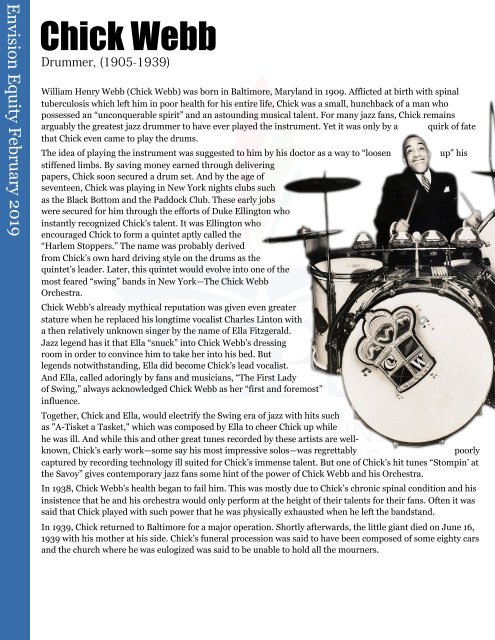Envision Equity February 2019 Special Black History Month Edition
Envision Equity February 2019 Special Black History Month Edition
Envision Equity February 2019 Special Black History Month Edition
You also want an ePaper? Increase the reach of your titles
YUMPU automatically turns print PDFs into web optimized ePapers that Google loves.
<strong>Envision</strong> <strong>Equity</strong> <strong>February</strong> <strong>2019</strong><br />
Chick Webb<br />
<br />
<br />
William Henry Webb (Chick Webb) was born in Baltimore, Maryland in 1909. Afflicted at birth with spinal<br />
tuberculosis which left him in poor health for his entire life, Chick was a small, hunchback of a man who<br />
possessed an “unconquerable spirit” and an astounding musical talent. For many jazz fans, Chick remains<br />
arguably the greatest jazz drummer to have ever played the instrument. Yet it was only by a quirk of fate<br />
that Chick even came to play the drums.<br />
The idea of playing the instrument was suggested to him by his doctor as a way to “loosen<br />
stiffened limbs. By saving money earned through delivering<br />
papers, Chick soon secured a drum set. And by the age of<br />
seventeen, Chick was playing in New York nights clubs such<br />
as the <strong>Black</strong> Bottom and the Paddock Club. These early jobs<br />
were secured for him through the efforts of Duke Ellington who<br />
instantly recognized Chick’s talent. It was Ellington who<br />
encouraged Chick to form a quintet aptly called the<br />
“Harlem Stoppers.” The name was probably derived<br />
from Chick’s own hard driving style on the drums as the<br />
quintet’s leader. Later, this quintet would evolve into one of the<br />
most feared “swing” bands in New York—The Chick Webb<br />
Orchestra.<br />
Chick Webb’s already mythical reputation was given even greater<br />
stature when he replaced his longtime vocalist Charles Linton with<br />
a then relatively unknown singer by the name of Ella Fitzgerald.<br />
Jazz legend has it that Ella “snuck” into Chick Webb’s dressing<br />
room in order to convince him to take her into his bed. But<br />
legends notwithstanding, Ella did become Chick’s lead vocalist.<br />
And Ella, called adoringly by fans and musicians, “The First Lady<br />
of Swing,” always acknowledged Chick Webb as her “first and foremost”<br />
influence.<br />
up” his<br />
Together, Chick and Ella, would electrify the Swing era of jazz with hits such<br />
as "A-Tisket a Tasket," which was composed by Ella to cheer Chick up while<br />
he was ill. And while this and other great tunes recorded by these artists are wellknown,<br />
Chick’s early work—some say his most impressive solos—was regrettably<br />
poorly<br />
captured by recording technology ill suited for Chick’s immense talent. But one of Chick’s hit tunes “Stompin’ at<br />
the Savoy” gives contemporary jazz fans some hint of the power of Chick Webb and his Orchestra.<br />
In 1938, Chick Webb’s health began to fail him. This was mostly due to Chick’s chronic spinal condition and his<br />
insistence that he and his orchestra would only perform at the height of their talents for their fans. Often it was<br />
said that Chick played with such power that he was physically exhausted when he left the bandstand.<br />
In 1939, Chick returned to Baltimore for a major operation. Shortly afterwards, the little giant died on June 16,<br />
1939 with his mother at his side. Chick’s funeral procession was said to have been composed of some eighty cars<br />
and the church where he was eulogized was said to be unable to hold all the mourners.

















